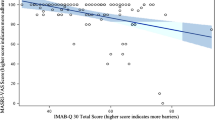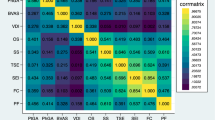Abstract
The primary purpose of this article is to document whether demographic, clinical, regimen-related, intrapersonal, and interpersonal factors predict medication non-adherence for vasculitis patients. A secondary purpose is to explore whether adherence varies by medication type and whether patients experienced drug-related side effects. Vasculitis patients (n = 228) completed online baseline and 3-month follow-up surveys. Demographic (age, gender, education, race, marital status, and insurance status), clinical (perceived vasculitis severity, disease duration, vasculitis type, and relapse/remission status), regimen-related (experience of side effects), intrapersonal (depressive symptoms), and interpersonal (adherence-related support from family and friends) factors were measured at baseline. Medication non-adherence was assessed at follow-up using the Vasculitis Self-Management Survey medication adherence subscale (α = 0.89). Variables that significantly correlated (p < 0.05) with non-adherence were included in a linear regression model to predict non-adherence. Younger age (r = −0.23, p < 0.001), female sex (r = 0.16, p < 0.05), experience of side effects (r = 0.15, p < 0.05), and more depressive symptoms (r = 0.22, p < 0.001) were associated with more medication non-adherence. In the regression model, younger age (β = −0.01, p = 0.01) and more depressive symptoms (β = 0.01 p = 0.02) predicted worse adherence. For six out of eight vasculitis medication types, patients who experienced side effects were less adherent than patients who did not experience side effects. Multiple factors are associated with medication non-adherence for vasculitis patients. Providers should discuss medication adherence and drug-related side effects with vasculitis patients. Providers may want to particularly target younger patients and patients with clinical signs of depression.

Similar content being viewed by others
References
DiMatteo MR, Giordani PJ, Lepper HS, Croghan TW (2002) Patient adherence and medical treatment outcomes: a meta-analysis. Med Care 40(9):794–811
Haynes RB, Sackett DL (1976) A critical review of "determinants" of patient compliance with therapeutic regimens. In: Compliance with therapeutic regimens. Johns Hopkins University Press, Baltimore, pp 26–39
DiMatteo MR, Lepper HS, Croghan TW (2000) Depression is a risk factor for noncompliance with medical treatment: meta-analysis of the effects of anxiety and depression on patient adherence. Arch Intern Med 160(14):2101–7
Clark NM (2003) Management of chronic disease by patients. Annual Rev Public Health 24(1):289–313
Fisher EB, Brownson CA, O’Toole ML, Shetty G, Anwuri VV, Glasgow RE (2005) Ecological approaches to self-management: the case of diabetes. Am J Public Health 95(9):1523–1535
Harrold LR, Andrade SE (2009) Medication adherence of patients with selected rheumatic conditions: a systematic review of the literature. Semin Arthritis Rheum 38(5):396–402
Salt E, Frazier S (2010) Adherence to disease modifying anti-rheumatic drugs in rheumatoid arthritis patients: a narrative review of the literature. Orthop Nurs 29(4):260–75
Treharne GJ, Lyons AC, Kitas GD (2004) Medication adherence in rheumatoid arthritis: effects of psychosocial factors. Psychol Health Med 9(3):337–49
Park DC, Hertzog C, Leventhal H, Morrell RW, Leventhal E, Birchmore D (1999) Medication adherence in the elderly. J Am Geriatr Soc 47:172–83
Bradley LA (1989) Adherence with treatment regimens among adult rheumatoid arthritis patients: current status and future directions. Arthritis Rheum 2(3):S33–S39
Kristensen LE, Saxne T, Nilsson J, Geborek P (2006) Impact of concomitant DMARD therapy on adherence to treatment with etanercept and infliximab in rheumatoid arthritis. Results from a six-year observational study in southern Sweden. Arthritis Res Ther 8:R174
Müller R, Kallikorm R, Põlluste K, Lember M (2012) Compliance with treatment of rheumatoid arthritis. Rheumatol Int 32(10):3131–5. doi:10.1007/s00296-011-2162-x
Thorpe CT, DeVellis RF, Blalock SJ, Hogan SL, Lewis MA, DeVellis BM (2008) Patient perceptions about illness self-management in ANCA-associated small vessel vasculitis. Rheumatology 47(6):881–6
Pepper J, Carpenter D, DeVellis R (2012) Does adherence-related support from physicians and partners predict medication adherence for vasculitis patients? J Behav Med 35:115–23
Carpenter DM, DeVellis RF, Hogan SL, Fisher EB, DeVellis BM, Jordan JM (2010) The effect of conflicting medication information and physician support on medication adherence for chronically ill patients. Patient Educ Couns 81(2):169–76
Popa-Lisseanu MG, Greisinger A, Richardson M, O’Malley KJ, Janssen NM, Marcus DM et al (2005) Determinants of treatment adherence in ethnically diverse, economically disadvantaged patients with rheumatic disease. J Rheumatol 32:913–9
Garcia-Gonzalez A, Richardson M, Garcia Popa-Lisseanu M, Cox V, Kallen M, Janssen N et al (2008) Treatment adherence in patients with rheumatoid arthritis and systemic lupus erythematosus. Clin Rheumatol 27(7):883–9
Salt E, Peden A (2011) The complexity of the treatment: the decision-making process among women with rheumatoid arthritis. Qual Health Res 21(2):214–22
Briesacher BA, Andrade SE, Fouayzi H, Chan KA (2008) Comparison of drug adherence rates among patients with seven different medical conditions. Pharmacotherapy 28(4):437–43
Harrold LR, Andrade SE, Briesacher BA, Raebal MA, Fouayzi H, Yood RA et al (2009) Adherence with urate-lowering therapies of the treatment of gout. Arthritis Res Ther 11(2):R46
Jayne D (2005) How to induce remission in primary systemic vasculitis. Best Practice & Res Clin Rheumatol 19(2):293–305
Radloff LS (1977) The CES-D scale: a self-report depression scale for research in the general population. Appl Psychol Meas 1:385–401
Thorpe CT, Devellis RF, Lewis MA, Blalock SJ, Hogan SL, Devellis BM (2007) Development and initial evaluation of a measure of self-management for adults with antineutrophil cytoplasmic antibody-associated small-vessel vasculitis. Arthritis Care Res 57(7):1296–302
Thorpe C (2006) Illness self-management among adults living with ANCA small vessel vasculitis. Dissertation, University of North Carolina at Chapel Hill.
Luqmani RA, Bacon PA, Moots RJ, Janssen BA, Pall A, Emery P et al (1994) Birmingham Vasculitis Activity Score (BVAS) Dim system necrotizinig vasculitis. QJM 87(11):671–8
DiMatteo MR, Haskard KB, Williams SL (2007) Health beliefs, disease severity, and patient adherence. Med Care 45(6):521–8
Dunbar-Jacob J, Mortimer-Stephens MK (2001) Treatment adherence in chronic disease. J Clinical Epidemiol 54(12):S57–S60
Hajj-Ali RA, Wilke WS, Calabrese LH, Hoffman GS, Liu X, Bena J et al (2011) Pilot study to assess the frequency of fibromyalgia, depression, and sleep disorders in patients with granulomatosis with polyangiitis (Wegener’s). Arthritis Care Res 63(6):827–33
Hoffman GS, Drucker Y, Cotch MF, Locker GA, Easley K, Kwoh K (1998) Wegener’s granulomatosis: patient-reported effects of disease on health, function, and income. Arthritis Rheum 41(12):2257–62
Boomsma MM, Bijl M, Stegeman CA, Kallenberg CG, Hoffman GS, Tervaert JW (2002) Patients’ perceptions of the effects of systemic lupus erythmatosus on health, function, income, and interpersonal relationships: a comparison with Wegener’s granulomatosis. Arthritis Rheum 47(2):196–201
DiMatteo MR (2004) Social support and patient adherence to medical treatment: a meta-analysis. Health Psychol 23(2):207–18
Carpenter DM, DeVellis RF, Hogan SL, Fisher EB, DeVellis BM, Jordan JM (2011) Use and perceived credibility of medication information sources for vasculitis patients: differences by gender. J Health Comm 16(6):629–42
Carpenter DM, Meador AE, Elstad EA, Hogan SL, DeVellis RF (2012) The impact of vasculitis on patient social participation and friendships. Clin Exp Rheumatol 30:S15–S21
Treharne GJ, Lyons AC, Hale ED, Douglas KMJ, Kitas GD (2006) 'Compliance' is futile but is 'concordance' between rheumatology patients and health professionals attainable? Rheumatology 45(1):1–5
Acknowledgments
We would like to thank the Vasculitis Foundation, its support group leaders, Vasculitis Foundation Canada, Wegener’s Granulomatosis Support Group Of Australia Inc, the Glomerular Disease Collaborative Network, the UNC Kidney Center (especially Ronald J. Falk, Kristen Hendrickson, and Caroline E. Jennette), and Jim Bornac for their help with recruitment. This work was supported by the Renal Epidemiology Predoctoral Traineeship at the UNC Kidney Center (T32DK007750), the Thurston Arthritis Research Center Postdoctoral Fellowship (5T32-AR007416), and the ACR REF/Abbott Health Professional Graduate Medical Student Research Preceptorship. The project described also was supported by the National Center for Research Resources and the National Center for Advancing Translational Sciences, National Institutes of Health, through Grant KL2TR000084. The content is solely the responsibility of the authors and does not necessarily represent the official views of the NIH.
Disclosures
None.
Author information
Authors and Affiliations
Corresponding author
Rights and permissions
About this article
Cite this article
Carpenter, D.M., Hogan, S.L. & DeVellis, R.F. Predictors of medication non-adherence for vasculitis patients. Clin Rheumatol 32, 649–657 (2013). https://doi.org/10.1007/s10067-013-2164-z
Received:
Revised:
Accepted:
Published:
Issue Date:
DOI: https://doi.org/10.1007/s10067-013-2164-z




